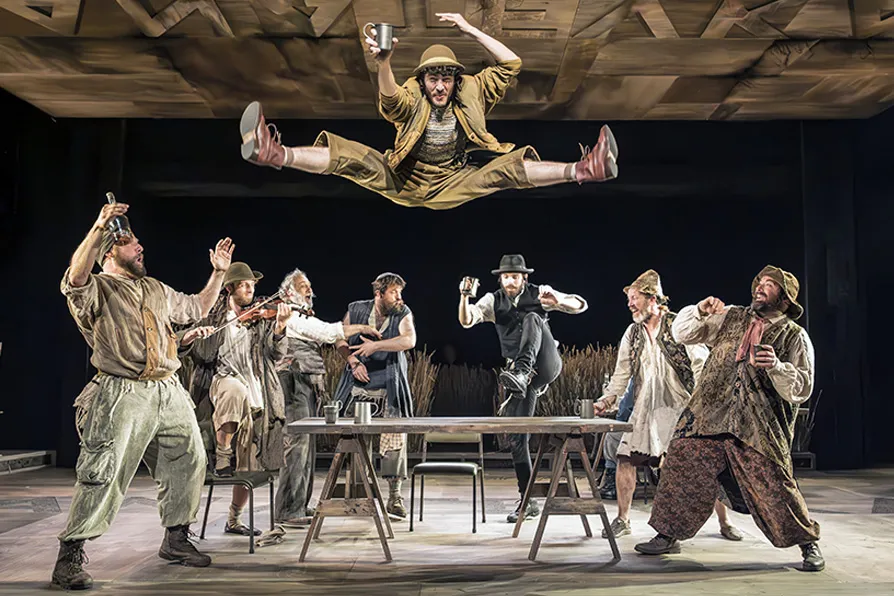SUE TURNER is fascinated by a book that researches who the largely immigrant workforce were that built the Empire State
WILL STONE applauds a fine production that endures because its ever-relevant portrait of persecution

 RAISING THE ROOF: The cast of Fiddler On The Roof at Barbican Theatre. [Pic: Marc Brenner]
RAISING THE ROOF: The cast of Fiddler On The Roof at Barbican Theatre. [Pic: Marc Brenner]
Fiddler On The Roof
The Barbican, London
★★★★
THIS sparky production of the popular 1960s musical, directed by Jordan Fein, was such a triumph at Regent’s Park Open Air Theatre last year that it’s been given a limited eight-week run at the Barbican this summer.
Of course, the most notable loss in such a move is the unique magic that the outdoor setting brought to this Broadway hit, but the Barbican Theatre’s capacity for staging the epic should not be underestimated. Designer Tom Scutt’s roof of corn – on which our eponymous fiddler perches, played astonishingly well by Raphael Papo – is complemented by a sun-soaked pastoral setting that transports you to a bygone era.
And there are as many layers to Fiddler as in its set design. Set in a Jewish shtetl, the fictional village of Anatevka in 1905 tsarist Russia, the show is steeped in cultural traditions, with the point comically hammered home by the trenchant opener, Tradition.
Poor milkman Tevye (Adam Dannheisser) dreams of being a rich man (If I Were A Rich Man) while beleaguered by his five daughters and headstrong wife Golde (Lara Pulver). He is forced to examine his beliefs, with the occasional monologue to God, while his three eldest daughters have more modern views on arranged marriages. His patriarchal worldview is challenged, and he comes to realise, that times they are a’changin and people nowadays marry for love – gasp!
Dannheisser is a spectacular Tevye, doing Chaim Topol and Zero Mostel proud, bringing an effortless humour to the hot-headed role.
Tevye’s eldest Tzeitel (Natasha Jules Bernard) narrowly misses being married off to the much older butcher Lazar Wolf (Michael S Siegel) and instead weds her amusingly effete childhood sweetheart, Motel (Dan Wolff), a penniless tailor on the quest for a sewing machine. Hodel (Georgia Bruce) falls for broke student revolutionary Perchik (Daniel Krikler) while Chava (Hannah Bristow) truly tests her father’s principles by eloping with Russian Christian peasant Fyedka (Gregor Milne).
Choreographer Julia Cheng also scores two masterstrokes: first, in the dream sequence, in which the entire cast conspires to convince Golde that Tzeitel should marry Motel rather than Lazar; and second, in the show-stopping bottle dance, originally created by Jerome Robbins.
Forever lurking in the background of Tevye’s familial conflict, though, is the ugly shadow of anti-semitic persecution. Tzeitel and Hodel’s wedding celebrations are cut short by a Russian mob carrying out a pogrom, and the first act closes with the haunting image of burning cornfields. By the finale, the entire village is uprooted and forced to move on in one final act of ethnic cleansing.
But what does a musical like Fiddler On The Roof teach us today, when Israel (with the help of the West) is committing ethnic cleansing and genocide in Palestine and Gaza, when Russia continues to pummel Ukraine with missiles, and when the wider global refugee crisis reveals the callous persecution of people from many cultures and creeds?
Fiddler sadly reminds us that history does repeat itself, and that the capacity for human evil endures. But can the cycle be broken, or is persecution here to stay as a universal and permanent blight?
For the perennial issues it raises, Fiddler is (and perhaps always will be) a timeless classic.
Runs until Saturday July 19. For more info visit www.barbican.org.uk

WILL STONE witnesses an experimental piano concerto inspired by the work of a young Jewish victim of the Nazis

MARY CONWAY is blown away by a flawless production of Lynn Nottage’s exquisite tragedy

WILL STONE foresees the refashioning of Beckett’s study of bitter nostalgia given the plethora of self-recording we make in the digital age











